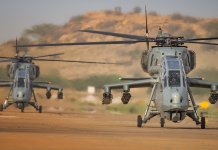There have been reports than Pakistan could send coronavirus infected terrorists across the line of control into Jammu and Kashmir and weaponize COVID-19 virus against the Indian Army as well as Kashmiri people.
The Indian Army even issued guidelines on handling & disposing bodies of terrorists. The soldiers deployed in the forward post have been asked to wear protective gear and maintain no direct contact with the dead bodies.
Now, Lt Gen. Anup Banerji – Director-General of the Armed Forces Medical Services (AFMS) said that the possibility of weaponising coronavirus against the Indian armed forces is low but they remain susceptible to such attacks until a vaccine or preventative medical therapy is not found.
This came after Lt General B.S. Raju, who heads the 15th Corps of the Indian Army said that they “received intelligence inputs that Pakistan is pushing a lot of COVID-19 infected patients into Pakistan-controlled-Kashmir”. The 15th Corps is engaged in security along the Line of Control (LOC) and operations in Jammu and Kashmir.
General Raju further added that they are conscious that Pakistan is taking the risk of putting gullible people and training them as terrorists and putting them into small, enclosed spaces in their launch pads.
This interview evoked a sharp response from Islamabad where Pakistan Army’s Inter-Services Public Relations (ISPR) tweeted claiming that it is an attempt to “divert global and domestic attention from the unending fiasco post – 5 Aug 2019”, referring to the revocation of the special status to Jammu and Kashmir.
The ISPR further claimed that “no less delusional are the allegations about Pakistan infiltrating COVID-19 affected individuals into IOJK. Pakistan has always extended unhindered UNMOGIP access to CFV sites.” UNMOGIP is the United Nations Military Observer Group in India and Pakistan.
Recently, New Delhi pitched for strict compliance of the Biological and Toxin Weapons Convention (BTWC) that prohibits the development and production of a range of weapons of mass destruction.
“India strongly believes that the BWC must respond effectively to the challenges posed by the new and emerging scientific and technological developments of relevance to the Convention,” said the Ministry of External Affairs.
By 2002, the Indian armed forces became concerned that terrorist outfits could use bio-weapons after the deadly attack on the Parliament. India possesses the biotechnological capabilities and infrastructure to produce such weapons but pledges to abide by BWC obligations.
Former President A.P.J. Abdul Kalam had stated after the development of such capabilities that “we [India] will not make biological weapons. It is cruel to human beings…”
According to the senior military officials, even though the coronavirus is highly contagious, it isn’t a “lucrative” biological weapon because of its low mortality rate. Also, most of the people infected remain asymptomatic.
The Army has always considered chemical, biological, radiological and nuclear (CBRN) warfare as a significant part of its strategical planning.
India already has the policy to prevent such attacks. “Exhaustive protocols are in place to ensure adequate protection for troops in sync with the guidelines being issued by the Government of India, without adversely affecting our security apparatus,” the officer added.
Another naval officer said that modern ships are designed to pass through contaminated areas that are mainly radioactive but could also include airborne attacks with chemical or biological weapons. He further added that the entire ship is closed down to an external environment and made airtight. The ventilation and filtration systems are recycled internally for habitation and continuation of operations.
The Indian Airforce also has an institute on nuclear, biological, chemical protection which generates awareness among troops about different agents and prepares them to handle such agents.
Penned By: Smriti Chaudhary




